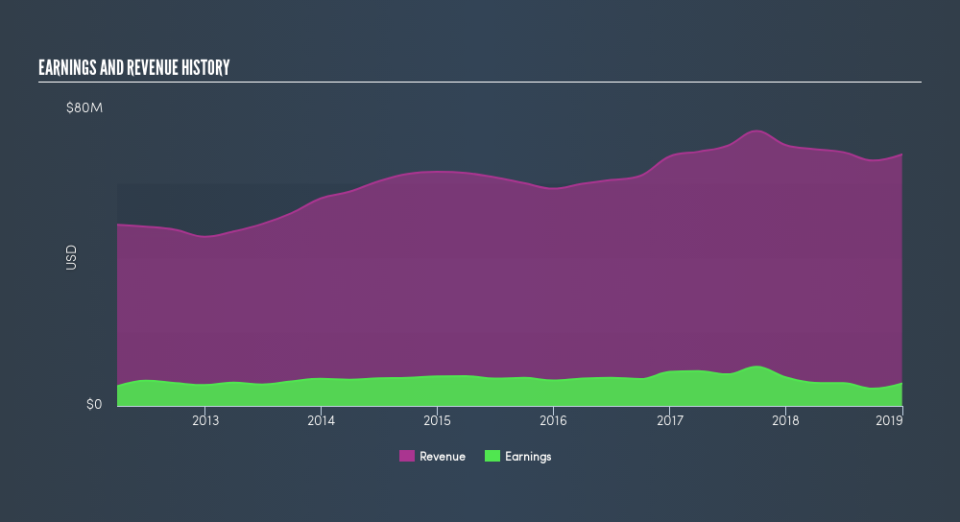What Kind Of Investor Owns Most Of Collectors Universe, Inc. (NASDAQ:CLCT)?

Want to participate in a short research study? Help shape the future of investing tools and receive a $20 prize!
If you want to know who really controls Collectors Universe, Inc. (NASDAQ:CLCT), then you’ll have to look at the makeup of its share registry. Large companies usually have institutions as shareholders, and we usually see insiders owning shares in smaller companies. I generally like to see some degree of insider ownership, even if only a little. As Nassim Nicholas Taleb said, ‘Don’t tell me what you think, tell me what you have in your portfolio.’
Collectors Universe is a smaller company with a market capitalization of US$144m, so it may still be flying under the radar of many institutional investors. Taking a look at our data on the ownership groups (below), it’s seems that institutions own shares in the company. Let’s delve deeper into each type of owner, to discover more about CLCT.
Check out our latest analysis for Collectors Universe
What Does The Institutional Ownership Tell Us About Collectors Universe?
Many institutions measure their performance against an index that approximates the local market. So they usually pay more attention to companies that are included in major indices.
As you can see, institutional investors own 38% of Collectors Universe. This suggests some credibility amongst professional investors. But we can’t rely on that fact alone, since institutions make bad investments sometimes, just like everyone does. When multiple institutions own a stock, there’s always a risk that they are in a ‘crowded trade’. When such a trade goes wrong, multiple parties may compete to sell stock fast. This risk is higher in a company without a history of growth. You can see Collectors Universe’s historic earnings and revenue, below, but keep in mind there’s always more to the story.
Our data indicates that hedge funds own 7.8% of Collectors Universe. That’s interesting, because hedge funds can be quite active and activist. Many look for medium term catalysts that will drive the share price higher. We’re not picking up on any analyst coverage of the stock at the moment, so the company is unlikely to be widely held.
Insider Ownership Of Collectors Universe
The definition of company insiders can be subjective, and does vary between jurisdictions. Our data reflects individual insiders, capturing board members at the very least. Company management run the business, but the CEO will answer to the board, even if he or she is a member of it.
I generally consider insider ownership to be a good thing. However, on some occasions it makes it more difficult for other shareholders to hold the board accountable for decisions.
It seems insiders own a significant proportion of Collectors Universe, Inc.. It has a market capitalization of just US$144m, and insiders have US$19m worth of shares in their own names. I would say this shows alignment with shareholders, but it is worth noting that the company is still quite small; some insiders may have founded the business. You can click here to see if those insiders have been buying or selling.
General Public Ownership
With a 41% ownership, the general public have some degree of sway over CLCT. While this size of ownership may not be enough to sway a policy decision in their favour, they can still make a collective impact on company policies.
Next Steps:
While it is well worth considering the different groups that own a company, there are other factors that are even more important.
I like to dive deeper into how a company has performed in the past. You can find historic revenue and earnings in this detailed graph.
If you would prefer check out another company — one with potentially superior financials — then do not miss this free list of interesting companies, backed by strong financial data.
NB: Figures in this article are calculated using data from the last twelve months, which refer to the 12-month period ending on the last date of the month the financial statement is dated. This may not be consistent with full year annual report figures.
We aim to bring you long-term focused research analysis driven by fundamental data. Note that our analysis may not factor in the latest price-sensitive company announcements or qualitative material.
If you spot an error that warrants correction, please contact the editor at editorial-team@simplywallst.com. This article by Simply Wall St is general in nature. It does not constitute a recommendation to buy or sell any stock, and does not take account of your objectives, or your financial situation. Simply Wall St has no position in the stocks mentioned. On rare occasion, data errors may occur. Thank you for reading.


